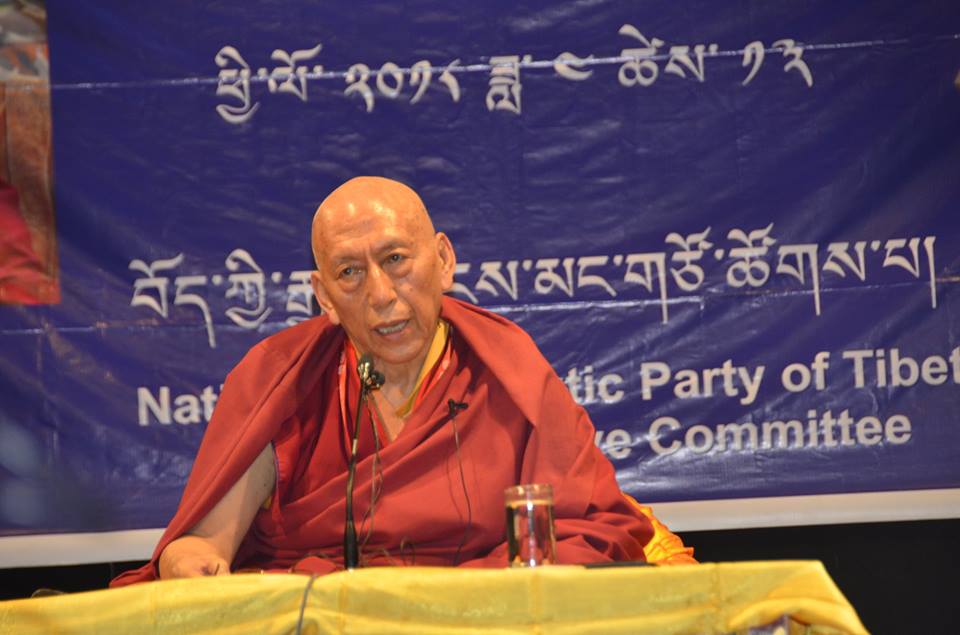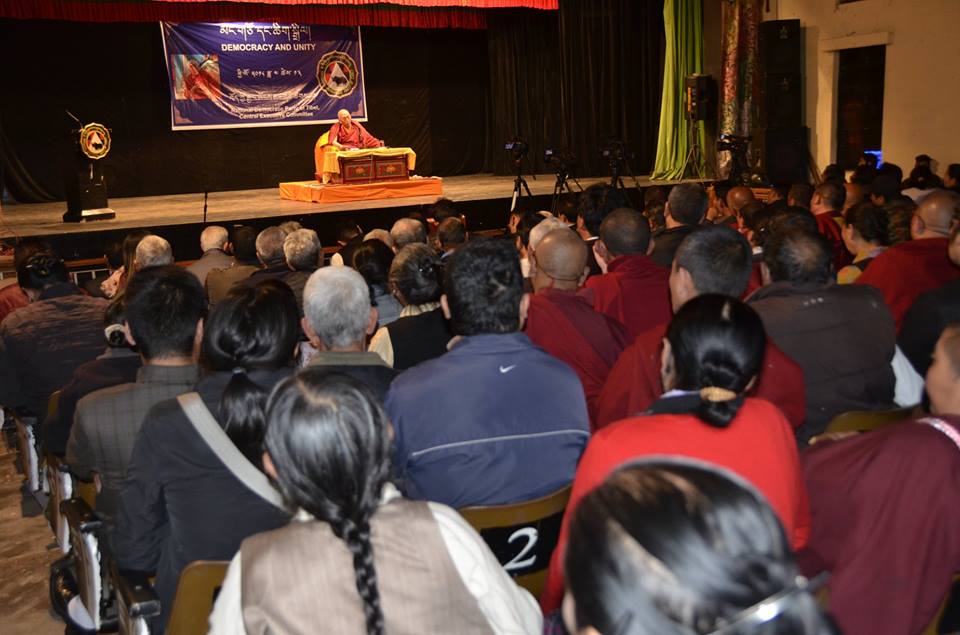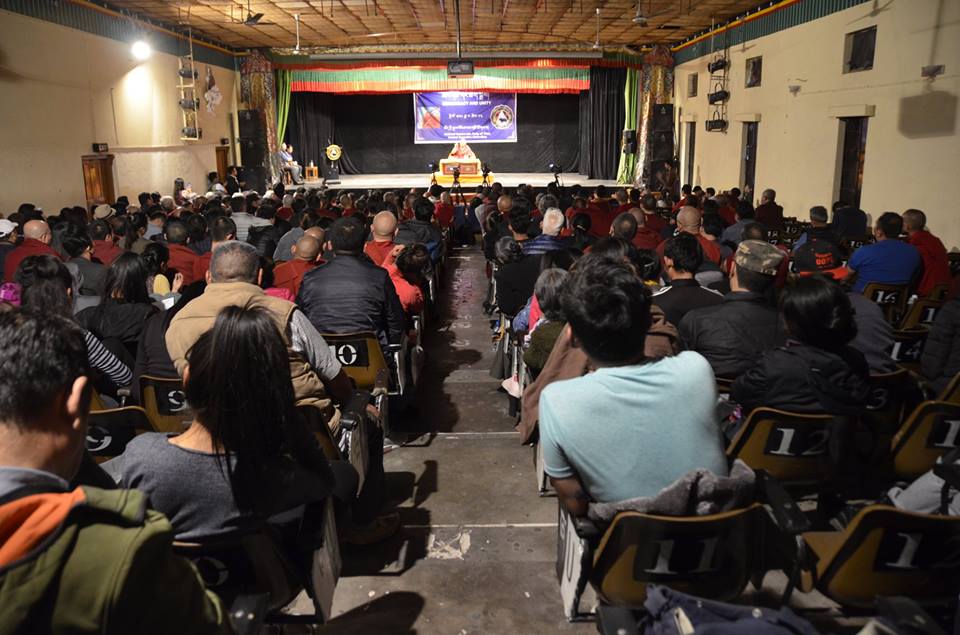A public talk on Democracy and Unity
At the request of National Democratic Party of Tibet, Dharamshala, on 13 April 2018 His Eminence Prof. Samdhong Rinpoche gave a public talk, in the hall of Tibetan Institute of Performing Arts, Dharamshala, on the requested theme of “Democracy and Unity.”
After a welcome speech and explanation for organising the talk, by the president of National Democracy Party of Tibet, His Eminence Rinpoche gave the talk.
His Eminence Rinpoche said: Many people may be thinking that the democratic system has come from the West. It is not so. Rather it is a knowledge that has initially flourished from India. From India it gradually spread to central Asia and then to the West; it has not come from the West. During the time of the Buddha, over 2500 years ago, there were six major and minor democratic republics, in India, without a king. Widely known of them was Vaishali.
At that time, as mentioned in the Sūtras-discourses, and other texts, the system was called “Headed by the masses,” collective paramountcy, the wording “democracy” might not have been used though. Likewise, in terms of a specific institution, the entire activities carried out in the ordained bhiksu community of Buddha Shakyamuni were genuinely democratic. ‘Genuinely democratic’ means unless all the ordained members agreed, the activity to be performed by the ordained collective would not be undertaken. There is in the modern democracy a situation called ‘majority consensus’ and ‘minority consensus,’ where what was consented to by the majority is to be accepted by the minority. Whereas, in the ordained bhiksu community, say, comprising of a thousand members, even if 999 members agreed/consented on a matter, if one member’s consent is lacking, a decision could not be made on the matter; at all times it was through general consensus, the decisions were not made on majority consensus. That is called a qualified democracy, a genuine democracy. Such knowledge and system of democracy had originated from India.
As regards the democratic system in the exile Tibetan community, His Eminence Rinpoche explained: The democracy being implemented by the exile Tibetan administration is a democracy without political parties, a partyless democracy, and slightly dissimilar to both presidential system and parliamentary system; it is functioning as a uniquely Tibetan system.
If it is asked, what is the essential purport of the exile Tibetans’ Constitution, it is a Constitution where the parliament is placed at the centre, a parliament-centric, the ultimate power is entirely with the parliament, and although the executive and judiciary powers are independent, as if devoid of interference by the parliament, yet when things come to a crux there is no other way other than through parliament; it has become a system where the parliament is placed at the centre. How that is so is, the power to dissolve/rescind the executive is with the parliament; likewise, although the judicial power has the full power to pass judicial judgments, the power to make changes to the judicial power is with the parliament. Everyone needs to know clearly the state/nature of the exile Tibetans’ unique Constitution; especially, it is important to understand for the entire public that on what legal bases one enjoys the democratic rights. If one does not study the Constitution it would then become difficult to enjoy all the democratic rights, and to accomplish all the democratic duties.
On the theme of “Tibetan unity” His Eminence Rinpoche said: We always talk of ‘unity,’ and everybody knows the need for it and its’ importance. So far, when a race of people ruled over another the biggest tool used for ruling was ‘divide and rule.’ All [of those ruled over] are divided into pieces/factions, or all are made internally at discord with one another and made to fight one another. In a children’s textbook there is a story of going to a cat for dividing a loaf of bread—all that are factual situations. When England ruled over two-third of the world their main tool was to divide. The same is with China; the late Phuntsok Wangyal had written a very famous long letter, in which he had, with emphasis, said that China is ruling by dividing [the ruled] into factions.
So we all know that we need unity. But why does not there arise the state of unity is that, the main foundation for unity is equality, which we perhaps do have. Second, there has to be trust with one another. They are the foundations for unity. As for trust, it is almost impossible for all people to have the same opinion. Since each person has different tendencies, likings, and so forth, so there can be discordant opinions, discordant ways of doing things, and similar and dissimilar wants. Nonetheless, the accord and discord with wants, and similar and dissimilar opinions are to be left at the level of opinions and tasks, they are not to be brought along upon person—that is an indispensable branch for unity. With that in mind the Buddha taught the four reliance: 1. Not to rely on person, rather to rely on the teaching; 2. as regards the teaching, Not to rely on words, rather to rely on the meaning; 3. as regards the meaning, Not to rely on the interpretive meaning, rather to rely on the definitive meaning; 4. as regards the definitive meaning, Not to rely on sensory consciousness, rather to rely on mental consciousness. If we are able to proceed as such, unity can occur. When His Holiness the Dalai Lama twice came to the parliament His Holiness had, with emphasis, advised the need to not get wrong the sequence of the four reliance.
His Eminence Rinpoche continued: If put in summary, having become dissatisfied with a work if one were to protest, one needs to protest against the work, pointing out that it was not done right, but one must not protest by saying that the person is not right. That was the essential purport of Gandhi’s advice: One needs to be merciful to the offender of the law, and that the act of the offence is to be challenged.
According to Marx there is nationalism, which is divided into two kinds: [National] Chauvinism, and Local nationalism. And it is said that if there is any of the two, unity cannot take place, there would arise racial separation and racial conflicts.
All we Tibetans are of one race, one nationality. Of the many minorities of races/nationalities of People’s Republic of China we are one race, not many. In our Tibetan society ‘Local nationalism’ and ‘Chauvinism’ cannot occur, yet in recent times there have been amongst us dividing/factionalising into regions, religious sects, groups and so forth, thereby there is taking place something akin to ‘Local nationalism.’ Factored by that, certainly a problem has formed with the state of our unity.
In carrying out any work there can be many viewpoints as regards its correctness or incorrectness, they can be true, they can be mistakes; anyway, if, from one’s viewpoint if it is seen as a mistake, one needs to have the confidence to say that it is a mistake, and one needs to say so as well. In not saying so, when it is a mistake, the public would become complicit as if accepting that. Gandhi had said, if one does not protest—rather leaves as it is—something that is against the law it would become as if one has accepted that; we must certainly challenge them, yet at all times we need to be compassionate and respectful to the doer. Not only Gandhi would respect, he would really trust the person; to the person against whom a protest is being staged Gandhi did not do any denigration and so on.
If there is trust there is no need to always gather together by many people, for unity. In our thinking we tend to view that, as if, for nationalistic unity, there has to be representatives of all races included, and that another race cannot perform a work of another race—if there is that kind of a narrow-minded thinking there is no way for unity to take place.
For instance, with regards to our three chol-kha (regions), there does arise the opinion that unless personnel from all three regions are included—for unity, for a position as a cook or a sweeper—there would not be unity. No matter whoever is included in the personnel from the three regions, there has to be the recognition/awareness that all three regions are one and equal, and a sense of responsibility brought about by that recognition; and, especially, if one were of the first region, to consider the welfare and the benefits of the other two regions—the second and the third—as the priority; and likewise, those of other regions consider your aspirations and benefits as the priority, and thus if everybody considers others as more important than oneself/one’s side, that unity would be a genuine one and concordant to factual reality.
His Eminence Rinpoche continued further with more insights and guidance on the requested theme.
Present at the talk were sitting and former members of the parliament, representatives of the Central Tibetan Administrations, representatives of non-governmental organisations, and members of public.
(The audio-visual recording of the talk is at this site: https://www.youtube.com/watch?v=ICBmqw-9TMw)


